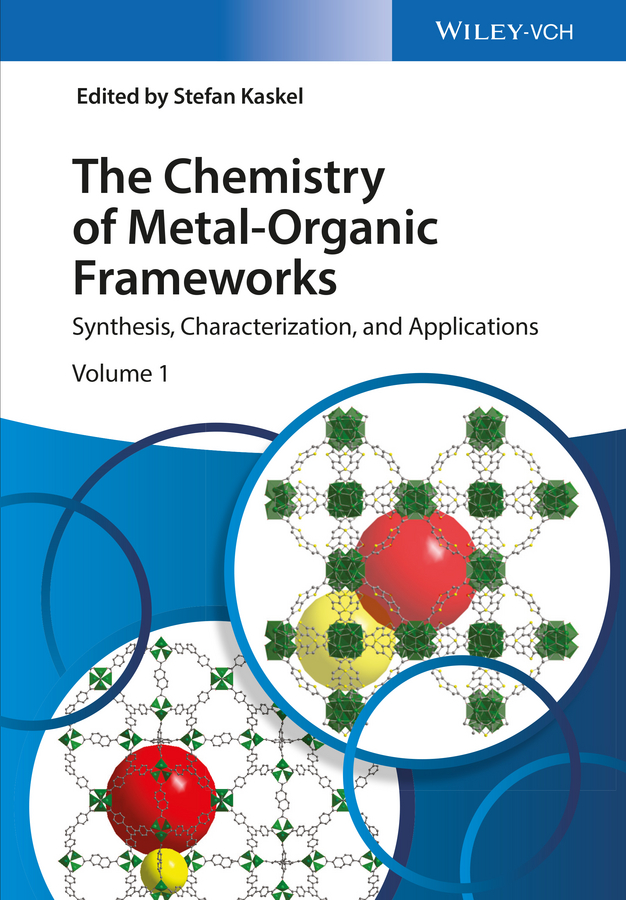Электронная книга: Stefan Kaskel «The Chemistry of Metal-Organic Frameworks. Synthesis, Characterization, and Applications»

|
Providing vital knowledge on the design and synthesis of specific metal-organic framework (MOF) classes as well as their properties, this ready reference summarizes the state of the art in chemistry. Divided into four parts, the first begins with a basic introduction to typical cluster units or coordination geometries and provides examples of recent and advanced MOF structures and applications typical for the respective class. Part II covers recent progress in linker chemistries, while special MOF classes and morphology design are described in Part III. The fourth part deals with advanced characterization techniques, such as NMR, in situ studies, and modelling. A final unique feature is the inclusion of data sheets of commercially available MOFs in the appendix, enabling experts and newcomers to the field to select the appropriate MOF for a desired application. A must-have reference for chemists, materials scientists, and engineers in academia and industry working in the field of catalysis, gas and water purification, energy storage, separation, and sensors. Издательство: "John Wiley&Sons Limited"
ISBN: 9783527693054 электронная книга Купить за 31273.44 руб и скачать на Litres |
Stefan Kaskel
Stefan Kaskel (* 1969 in Bonn) ist ein deutscher Chemiker.
Inhaltsverzeichnis |
Leben
Stefan Kaskel studierte von 1990 bis 1995 Chemie an der Eberhard-Karls-Universität Tübingen. Seine Diplomarbeit schrieb er 1995 zu dem Thema: "Versuche zur Darstellung von Nitridfluoriden der Elemente Wolfram und Mangan" bei Joachim Strähle. Am Ende seines Studiums dissertierte er zu dem Thema: "In situ-Pulverdiffraktometrie zur Untersuchung von Ammonolyse und Hydrolysereaktionen" wiederum bei Strähle mit summa cum laude. Für diese Dissertation erhielt er 1997 den Young Scientist Award der European Powder Diffraction Conference in Parma, Italien.
Von 1998 bis 2000 untersuchte er im Rahmen des Feodor Lynen-Stipendium der Alexander von Humboldt-Stiftung die „Synthese, Struktur und Bindungsverhältnisse in anionischen Clustern der schweren Triele Gallium, Indium und Thallium“ am Ames Laboratory des US-Energieministeriums (DOE) und der Iowa State University in Ames, Iowa.
Danach habilitierte er bis 2003 zu dem Thema: „Design und Funktion neuartiger poröser Materialien“ am Max-Planck-Institut für Kohlenforschung in Mülheim an der Ruhr und der Ruhr-Universität Bochum bei Prof. Ferdi Schüth. Währenddessen arbeitete er auch als Gruppenleiter am Max-Planck-Institut für Kohlenforschung und bekam 2002 den BMBF-Nachwuchspreis in Nanotechnologie. Seit dem 1. Juni 2004 hat er den Lehrstuhl für Anorganische Chemie I (C4-Professur) an der TU Dresden inne. Er ist Mitherausgeber des Journal of Nanoscience and Nanotechnology, Mitglied der GDCh sowie der American Chemical Society.
Forschungsinteressen
- Entwicklung neuer molekularer Precursoren
- Poröse Materialien: Synthese, Charakterisierung und Verwendung
- Anorganische Nanopartikel
- Nanokomposite und Hybridmaterialien
- Heterogene Katalyse
- Methoden: Einkristall-Röntgenstrukturanalyse, Pulverdiffraktometrie, Adsorption, Mikroskopie, dynamische Lichtstreuung
Publikationen
- S. Kaskel: In-situ-Pulverdiffraktometrie zur Untersuchung von Ammonolyse- und Hydrolysereaktionen, Univ. Tübingen, Dissertation, 1997.
- S. Kaskel: Porous Metal-Organic Frameworks in Handbook of Porous Solids, F. Schüth, K. S. W. Sing, J. Weitkamp (Ed.), Wiley-VCH, Weinheim, 2002, 1190–1249.
- P. Llewellyn, S. Kaskel: Miscellaneous Solids in Handbook of Porous Solids, F. Schüth, K. S. W. Sing, J. Weitkamp (Ed.), Wiley-VCH, Weinheim, 2002, 2063–2086.
Weblinks
Источник: Stefan Kaskel
Другие книги схожей тематики:
| Автор | Книга | Описание | Год | Цена | Тип книги |
|---|---|---|---|---|---|
| Stefan Kaskel | The Chemistry of Metal-Organic Frameworks. Synthesis, Characterization, and Applications | Providing vital knowledge on the design and synthesis of specific metal-organic framework (MOF) classes as well as their properties, this ready reference summarizes the state of the art in chemistry… — John Wiley&Sons Limited, электронная книга Подробнее... | 31273.44 | электронная книга | |
| Bernadette Charleux | Chemistry of Organo-hybrids. Synthesis and Characterization of Functional Nano-Objects | This book provides readers with a one-stop entry into the chemistry of varied hybrids and applications, from a molecular synthetic standpoint• Describes introduction and effect of organic… — John Wiley&Sons Limited, электронная книга Подробнее... | 11968.57 | электронная книга |
См. также в других словарях:
Metal-organic framework — Metal Organic Frameworks are crystalline compounds consisting of metal ions or clusters coordinated to often rigid organic molecules to form one , two , or three dimensional structures that can be porous. In some cases, the pores are stable to… … Wikipedia
Covalent organic framework — The design and synthesis of crystalline extended organic structures in which the building blocks are linked by strong covalent bonds are core concepts of covalent organic frameworks (COFs). COFs are porous, and crystalline, and made entirely from … Wikipedia
Coordination polymer — A coordination polymer is an inorganic or organometallic polymer structure containing metal cation centers linked by ligands, extending in an array. It can also be described as a polymer whose repeat units are coordination complexes. Similar… … Wikipedia
Bisphenol A — Bisphenol A IUPAC name … Wikipedia
Scientific method — … Wikipedia
